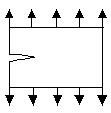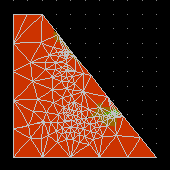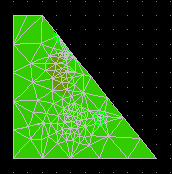|
Understanding your results
Remember, your cracks had to start on the exterior boundary.
Variations to try:
structure with and without a crack
structure with one crack or multiple cracks
different loads: only the water load, only the weight load, or both
different attachments at the foundation:
attach the whole bottom edge or just
the bottom corners
Here are some examples of loading that will make a crack grow:
|
apply load in tension perpendicular to the crack |
 |
apply load in compression directly on the crack mouth. |
 |
Why did the crack grow?
Think about the load
that you applied to the structure.
What can I learn from the stress contours?
Stress contours may have a couple different colors in one frame, and the
shape and/or colors of the contour may change between frames as the crack(s)
advance. Notice where the highest stress usually are (the blues or the
greens): maybe near your foundation or at the crack tips. The high
stress (*) at a
crack tip is called a stress concentration.

You might notice that the stress contours change from blue to green or
green to red as your crack grows. The is because the crack has relieved some
of the stress in the rest of your structure.
How do you calculate stress?
|
 |
 |
Only one of my cracks grew. What does this mean?
If you had more than one crack and only one of them grew, this means that
there was only enough energy in the system to
propagate one crack. Engineers use simulations like these to recreate how a
crack grew or to try to predict how a crack will grow. This information helps
them figure out how to repair the crack.
You have reached the end
of the Simulation!
Please check out one of the other sections by
choosing from the side menu or continue on to the quiz.
|

